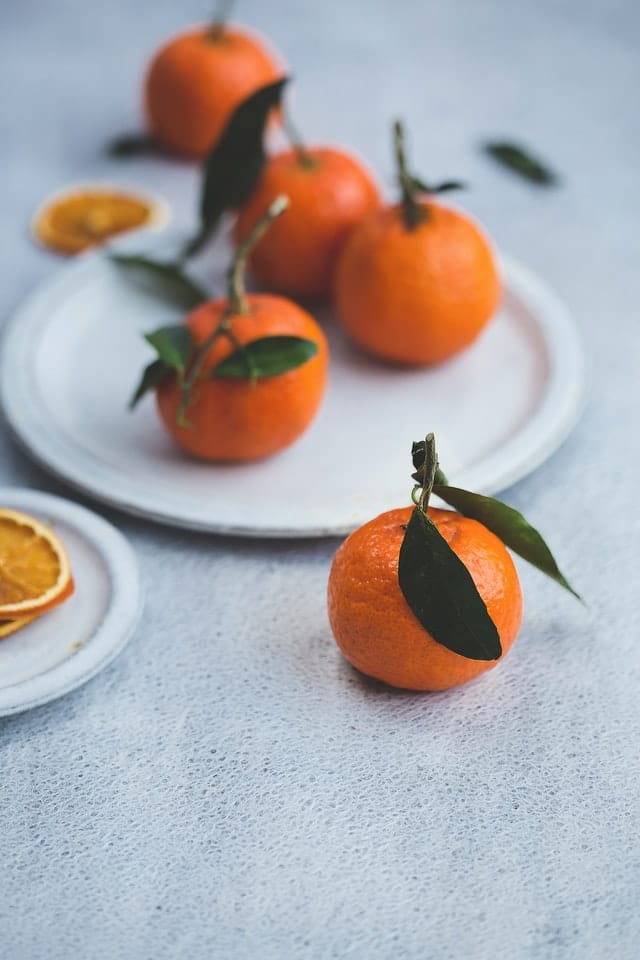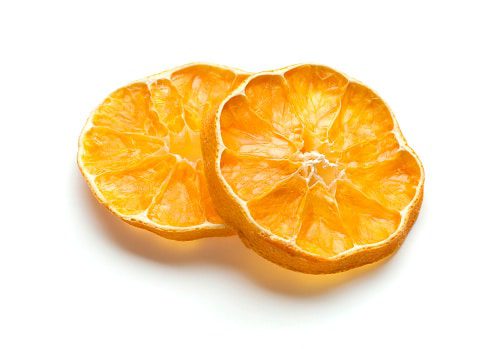It is surprising that orange, which is a very sunny fruit, is only available during one of the bleakest of all months, i.e., during the winter season! Oranges are luscious and sumptuous. They are juicy and beautiful. Their aroma can fill up an entire room and acts as a great mood lifter. Orange has various uses but is especially demanded of its Vitamin C content, which boosts the body’s immunity and reduces various ailments. To dehydrate oranges can be a good option. It could serve as an excellent snacking option and can be very attractive because of its tangy taste.
Oranges must generally be heavy and firm and have smoothly textured skin. Orange has several health benefits, some of which have been listed below:
- Healthy immunity system.
- Prevents any skin damage.
- Controls the level of blood sugar.
- Lowers chances of developing cancer.
- Lowers cholesterol levels.
- It helps to keep a check on blood pressure.
- It alkalizes the body.
- It is good for eye health.
- Acts as a safeguard against constipation.

The first and foremost question which comes to mind is, can you dehydrate oranges? Well, yes, dehydrating tangerines is a pretty easy task, and dehydrated oranges are quite flavorful for the tongue. If you do not feel like taking the pains, though they can be bought from the market.
Now, the prime question is how to dehydrate orange in a food dehydrator. Dehydrating oranges is pretty easy and can be done in a few basic steps. The steps are as follows:
- Wash the fruit and dry it.
- Make slices of the oranges in 1/4th inch thick oranges.
- If the oranges are full of seeds, they need to be picked out.
- Take out dehydrator trays and arrange slices.
- Put the dehydrator at 1100. You can opt for higher temperatures, and the oranges can be dried in lesser time. However, a lesser temperature helps to preserve orange oil, which is in a rind. The oil adds flavor.
- The time required for drying might last for two days based on the size of the oranges. Start checking the oranges after the very first day.
- The oranges must be crispy, having no moisture content.
- Keep the slices at room temperature for cooling before you store them in air-tight jars or other air-tight lids containers.
- The container needs to be stored in a cool and dark place to preserve the fruit’s color.
Having already solved the problem of ‘how to dehydrate oranges,’ quickly go through the benefits of dehydrating them.
Table of Contents
What uses can dehydrated oranges be put to?
- For travel food and also for quick snacks
- In making orange tea
- For garnishing
- Grinding into powdery form and using for flavoring soups, baked goods, and stews.
How about slipping in a dried orange slice at the cocktail’s edge?
Oranges can also be dried in the oven. Oh, how heavenly are oven-dried slices of oranges! Imagine munching on lightly sweetened and sprinkled with coconut sugar and spices oven-dried oranges. How to proceed with drying oranges in the oven. The ingredients required to dehydrate oranges are:
- Two large navel or blood oranges
- Slice them thinly.
- ¼ cup raw or coconut sugar
- ½ tsp cinnamon.
- A dash of sea salt and ginger
Instructions:
- Preheat your oven to 2000F.
- Wash the oranges and dry them.
- Cut the oranges into very thin pieces.
- Lay the slices flat on a baking sheet having parchment paper.
- Mix requires sugar and spices in a small bowl.
- Sprinkle the mixed spices over the orange slices.
- Dry in the preheated oven at a temperature of 2000F for around 21/2-3 hours.
- If the oranges are sliced thicker, then the time taken will be longer.
- Add more sugar or spices as required.
- Store in a dry and cool place.
Mandarin oranges that are dehydrated could add as a fun snack option, especially for the kids. They are sweet and chewy, just like candy. However, they contain no dyes and processed sugar. So, coming to the most pertinent question, i.e., how can you be dehydrating mandarin oranges?
Instructions:
- Remove the orange peels and dehydrate them separately.
- Peelings could be grounded into powder form for meat rubs and teas.
- Section the mandarin oranges into natural sections.
- Arrange the mandarin orange slices properly on dehydrator trays.
- Coat the orange slices evenly with lemon juice.
- For making the task of coating easier, hold the dehydrator tray over the sink and use a spray bottle for spraying the lemon juice evenly.
- Dehydrate at a degree of 125 F for nearly 10-12 hours.
- Dehydration can be conducted for a lesser time, i.e., 8 hours if you desire the end product to be chewier just as raisins are. But these cannot be stored for a prolonged time and need to be consumed as soon as possible.
- The end products can be stored in a vacuum place with a Mylar bag or even in mason jars having oxygen packs for a shorter time. This is how to dehydrate oranges.

Dryness check for dehydrated oranges:
A mandarin slice that has been dehydrated fully will be dry. It would feel sticky on being touched. The slices will be malleable to a certain extent, and they can be separated into halves if not crumbled.
A mandarin slice that is dry yet not completely dehydrated would feel sticky and moist. It will be like a raisin, i.e., chewy.
Something can be considered fully dehydrated if greater than 95% of moisture content is removed. Thus, it can be seen that dehydrating oranges food dehydrator is amply available and relatively easy to get hold of. Not only mandarins, dehydrating tangerines need the application of the same steps.
So what uses can you put dehydrated orange peel?
Scrub the mandarin or tangerine orange clean. Then, peel their outer skin carefully so that you do not pick the whiter part inside.
Once the entire orange has been peeled, stack the slices together. Cut the slices into thin strips.
Put your oven to the lowest possible temperature and layout the strips over the baking paper.
After 20-30 minutes, get them out once they are hardened and start curling.

Ways In Which You Can Use These Dehydrated Orange Peels:
- Marinades: Why not make a different type of marinade for your fish or chicken with olive oil, thyme in the case of chicken and dill in the case of fish, and grounded orange peel. Put in some basil. Add some pepper, garlic, and salt.
- Infusions: In an air-tight jar, add the strips of dehydrated orange peel and ¼ cup containing olive oil. You can feel the aroma in just a week, and your orange olive oil will be ready. It is great for your cooking and salad dressings. With a greater length of time given for infusion, it will turn out to be more flavourful.
Oil can also be infused for a wholesome and relaxing body massage. Imagine putting in some cinnamon sticks, dried hibiscus, and cloves along with the orange peels. How amazing it will smell!
- Flavoured Salt: Grind the peels and mix with any dried herbs like rosemary or thyme. Add in a bit of your most preferred salt. It is a simple DIY gift for any occasion and can also add an extra flavor to your kitchen prepared delicacies.
- Tea: If you are a flavored tea addict, then this is your perfect go-to option. Dehydrate orange peel and add them to your black or green tea for a nice and flavourful twist.
You can also make bath tea! Add a few dehydrated orange peels to your warm bath. Grab a small muslin bag with mixed cotton. Fill it with the peel, Epsom salts, and cinnamon stick. Next, you’ll feel like heaven’s come down to you!
Pieces or strips of dehydrated orange would work wonders here.
- Potpourri: Organe peels are attractive because of their appearance and can add to the gift options for simple yet natural décor. You can intermix it with autumnal spices such as cloves and cinnamon sticks. Add to it a few essential oil drops made of orange and boost the whole fragrance.

Dehydrating Oranges To Eat
Dehydrated oranges are not only useful for garnishing and using as decorating items, but they can also be eaten just as sticky candies or by adding them to different delicacies.
However, you can dehydrate oranges for putting to other uses as well apart from eating. Here are the six things you can do with dehydrated orange peels and slices:
- Holiday Garland: Dehydrated slices can be easily converted into ornaments for the Christmas tree or the Holiday Garland. Post dehydrating, the slices need to be strung together and wrapped around the tree. It can be hung on a mantle, windowsill, wall, or coffee table. Not only for the aesthetic view, but the aroma is also highly accountable for impressing your guests.
- Mulling Spices: Dried oranges can be extremely useful for mulling cider or wine. Mix some peels or dried orange slices with nutmeg, cinnamon, and cloves. Then put the mixture on the stove for heating.
- Garnishing for the beverage: They can be used to garnish any beautiful winter beverage or cocktail by putting the peels on the glass’s rim. Or you could throw the slices into the prepared drink for adding a tangy twist to its taste.
- Make peel zest from dried oranges: After dehydrating mandarin oranges, they can be grounded in a coffee grinder or blender and stowed away in a cabinet. The orange zest will be taken out whenever it is required for baking recipes.
- Add to a homemade candle: Up for a fun and DIY project? Dried orange peels and slices could be one fun way of spicing up your homemade candles. They can either be ground and mixed with the wax or broken up into chunks to accent the candles’ outer rim. Or you can just put them around the candle in one hurricane candle holder.
- Orange flavored sugar or salt: How about some orange peels being dried in a coffee grinder or blender? Once it is grounded into smaller bits, it can be mixed with sugar or salt for flavoring. Want to go the extra mile? Add the bits of orange peel to a lip balm or sugar scrub.

Thus, it can be seen that apart from eating, you can dehydrate oranges for putting it to multivariate purposes.
It is good to consume or use these citrus fruits as we need Vitamin C content daily. It can be especially good when you are out backpacking or hiking as this Vitamin C rich snacking option can help to rebuild bones and tissues, reduce cold symptoms, boost immunity, and reduce inflammation. Dehydrated orange and lemon slices could add color and flavor to your cold or hot trail drinks. Dried and peeled tangerine or grapefruit wheels could make for a tasty snack when you go hiking.
Now that you know how to dehydrate oranges or how to dry oranges, why not try it at home and either consume it for its own sake as chewy and sticky candies or put it to various cooking uses like mixing it with spices and cider?
-
How can you use dehydrated oranges?
1. Drinks – You can flavor water and tea
2. Snacks – You can use them as snacks with no chocolate.
3. Garnish – You can garnish desserts, cocktails, or platters and give them a fantastic taste.
4. Decorations – You can use dry oranges for Christmas decorations, wall hangings, or in potpourri. -
How long can you use dried oranges?
You can make use of dry oranges for around two years. But, it would help if you make sure that these are appropriately dehydrated, and preserved nicely.
-
Can you consume the dried orange peel?
Of course! You will relish the peel. Once your orange slices are dried, use them as a garnish when it comes to meals and cocktails. You can also mix them in muesli and enjoy it.
-
Why dehydrate oranges?
The dried oranges turn into tangy, delicious snacks. You can also use them as a garnish for cocktails and tea. You can use the orange peels to augment the aroma of many dishes. Store them properly, and you can use them for months and even years.




